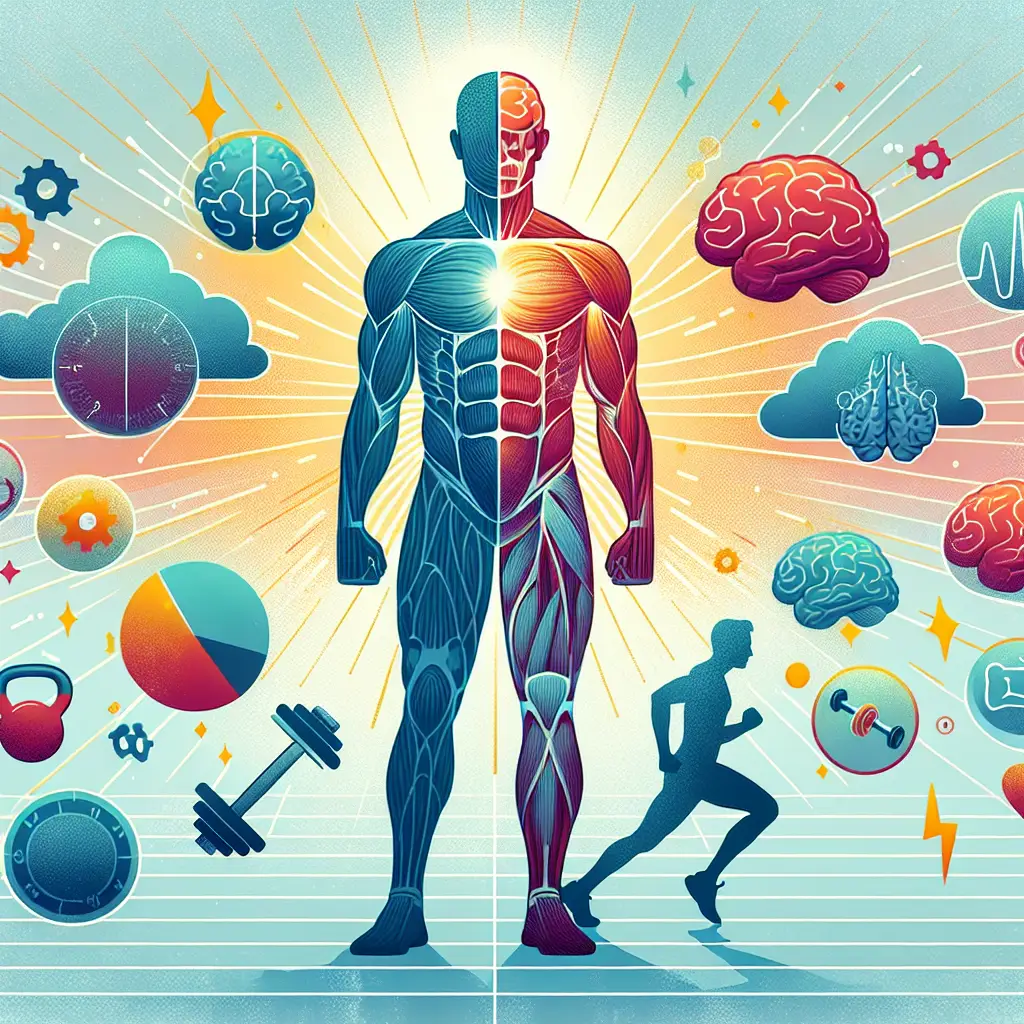
Mind Over Muscle: The Proven Truth About Exercise and Mental Wellness
Introduction
In a world where mental health is gaining recognition as one of the most crucial components of well-being, the saying “mind over matter” has never felt more relevant. When we consider the connection between exercise and mental wellness, we uncover a tapestry of scientific evidence and personal stories that affirm the powerful unity of mind and body. Welcome to the journey of discovery in our article, Mind Over Muscle: The Surprising Truth About Exercise and Mental Wellness. Here, we unravel how physical activity does more than just build muscles; it reshapes our mental landscapes and elevates our emotional health.
The hustle and bustle of daily life can take a toll on our mental state. From stress at work to personal challenges, modern living requires effective coping mechanisms. Traditional wisdom advocates for physical fitness primarily as a means to achieve a healthy body, but increasingly, research reveals that regular exercise can be just as essential for nurturing mental wellness.
Join us as we delve into the remarkable interplay between physical activity and mental health, illustrated through compelling case studies and backed by scientific research. By the end of our exploration, you will appreciate why Mind Over Muscle: The Surprising Truth About Exercise and Mental Wellness is a motto worth adopting.
The Science Behind Exercise and Mental Health
Understanding the Connection
Research in psychology and neuroscience has continuously highlighted the complex benefits of exercise on mental health. Regular physical activity is shown to decrease symptoms of depression and anxiety, improve mood, and enhance cognitive function. A study published in the American Journal of Psychiatry indicated that even a moderate amount of exercise, such as brisk walking for about 150 minutes a week, could significantly reduce the risk for anxiety disorders.
Neurotransmitters at Play
When we move our bodies, we trigger the release of endorphins—those feel-good hormones that play a crucial role in mood regulation. Exercise stimulates the production of serotonin, dopamine, and norepinephrine, chemicals that contribute to feelings of well-being and happiness.
Moreover, studies demonstrate that exercise promotes neuroplasticity, the brain’s ability to form new neural connections. This means that through regular exercise, we can actively enhance our cognitive abilities and resilience to stress.
Real-World Example: The Finnish Study
A landmark study from Finland examined the links between physical activity and mental health outcomes. Researchers found that adolescents who engaged in regular aerobic exercise displayed fewer symptoms of depression than their sedentary peers.
This Finnish study is an excellent example of the broader principle: Mind Over Muscle: The Surprising Truth About Exercise and Mental Wellness underscores that physical fitness can lead to improved mental health outcomes, particularly in youth.
The Role of Mindfulness in Exercise
Merging the Physical with the Mental
Incorporating mindfulness into exercise routines can amplify mental well-being further. Mindfulness practices encourage athletes and fitness enthusiasts to focus on their internal experiences—such as breath, movement, and sensations—during their workouts. This process fosters a stronger connection to one’s body, which can reduce stress levels and create a meditative experience.
Practice Case Study: Yoga and Mental Wellness
One compelling case study comes from the world of yoga. A randomized controlled trial conducted at a local university explored the effects of yoga on participants suffering from anxiety and mood disorders. The study found that after eight weeks of yoga practice, participants reported significant reductions in anxiety and stress levels.
This aligns with the notion of Mind Over Muscle: The Surprising Truth About Exercise and Mental Wellness: Yoga serves as a dual-purpose practice, enhancing physical fitness while also cultivating a peaceful mind.
Group Exercise: The Social Dimension
Connecting Through Movement
Exercising alone has immense benefits, but there is a unique power in group exercise. Being part of a community that emphasizes fitness can bolster motivation and create long-lasting bonds. Sharing experiences with others during workouts fosters social interactions that can transcend mere physical activity.
Case Study: Community Fitness Programs
Consider the success of community fitness initiatives like “Parkrun” worldwide. These weekly events, where participants can walk, jog, or run together, have grown exponentially. A study observing participants found that regular involvement led to improved mental health indices, including enhanced happiness and reduced social isolation.
The outcomes of such community-centered programs illustrate the principle of Mind Over Muscle: The Surprising Truth About Exercise and Mental Wellness – physical activity can engender a sense of belonging and purpose that significantly benefits mental health.
The Impact of Different Types of Exercise
Aerobic vs. Anaerobic: What’s More Effective?
Most research has emphasized the benefits of aerobic exercise, which includes activities like running, swimming, and cycling. However, anaerobic exercises such as weight lifting and resistance training are now being recognized for their mental health benefits as well.
The Power of Resistance Training: A Recent Study
A recent study published in Psychological Science delved into the effects of resistance training on older adults facing cognitive decline. The findings revealed that those engaging in strength training routines reported improvements in cognitive function and mood, thus demonstrating a nuanced aspect of Mind Over Muscle: The Surprising Truth About Exercise and Mental Wellness.
A Comparative Table of Exercise Types
| Type of Exercise | Benefits for Mental Health | Recommended Duration |
|---|---|---|
| Aerobic | Reduces anxiety, boosts mood through endorphins | 150 minutes/week |
| Anaerobic | Enhances mood, supports cognitive function | 2-3 times/week |
| Yoga | Improves mindfulness, reduces stress | 1-2 times/week |
| Group Classes | Increases motivation, fosters community | Variable |
Insights from Athletes: Mental Resilience
The Mindset of High-Performing Athletes
One of the most compelling aspects of fitness is found within the stories of athletes who have harnessed the power of mental strength to push beyond their physical limitations. The high-performance sphere elucidates the critical link between mental resolve and athletic achievement.
Case Study: Endurance Athletes
Take, for example, the case of ultra-marathon runners. In interviews, many have articulated how the grueling nature of their sport requires not just endurance but also intense mental focus and resilience. Many report using mindfulness and visualization techniques to push through mental barriers during races.
This directly correlates with Mind Over Muscle: The Surprising Truth About Exercise and Mental Wellness: the connection between a strong mind and peak physical performance is undeniable.
Actionable Steps to Apply
Building Your Personalized Routine
As we’ve explored the profound link between exercise and mental health, it is vital to consider how one can start implementing these insights into a daily routine. Here are key actionable steps:
Set achievable goals: Begin with small, manageable fitness objectives, whether that’s a walk after dinner or practicing yoga twice a week.
Incorporate variety: Mix different types of exercises to enhance both physical and mental engagement—think running, weight training, and yoga.
Join group activities: Participating in classes or community fitness events can enhance social connections and motivation.
Practice mindfulness: Whether you choose yoga or simply focus on your breath during routines, aim to incorporate mindfulness into your practice.
- Track progress: Keep a journal of mental and physical changes. Recognizing progress can be a powerful motivator.
Conclusion
At the intersection of mind and body lies a transformative path toward enhanced well-being. The journey through Mind Over Muscle: The Surprising Truth About Exercise and Mental Wellness reveals that exercise is not just about building muscles; it is about strengthening the psyche, enhancing emotional resilience, and combating mental health challenges.
The insights explored throughout this article make it clear that embracing a regular fitness regime can lead to substantial improvements in mental wellness. Consequently, let us be proactive in our approaches toward physical activity, knowing that each step taken is a step toward a healthier mind.
Embrace the power of motion and let your mental wellness flourish. Go ahead and take that next step—because when you prioritize your health, you also prioritize your happiness.
FAQs Section
1. How often should I exercise to see mental health benefits?
Most guidelines recommend at least 150 minutes of moderate aerobic exercise per week, but even short bouts of activity can yield mental health benefits. Aim for consistency!
2. Can strength training improve mood?
Yes! Research suggests that resistance training can enhance mood and cognitive function, making it a valuable tool for mental wellness.
3. What type of exercise is best for anxiety?
Both aerobic exercises like walking or running and mind-body practices like yoga have shown effective in reducing anxiety symptoms.
4. How does physical activity impact stress management?
Exercise can lead to the release of endorphins and promote neuroplasticity, helping to manage stress and develop coping mechanisms for life’s challenges.
5. Are there any risks associated with exercising for mental health?
While exercise has numerous benefits, it is essential to listen to your body. Overexertion can lead to injury or burnout, so ensure a balanced approach to physical activity.
By actively engaging in physical fitness, you not only nurture your body but also cultivate the most essential aspect of wellness—the mind. Harness the synergy of mind and muscle, transforming your approach to both exercise and mental well-being. Start today!











